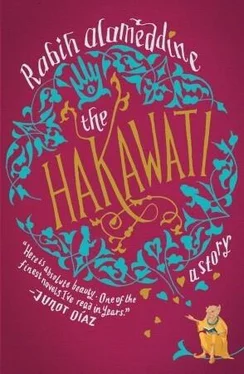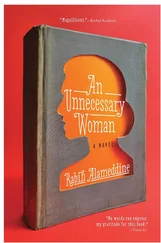“You said I play like a donkey.”
“Well, then, come here and play something different and don’t play like a donkey.” He patted the cushion next to him, took out his tobacco pouch, and began to roll. I didn’t move. Keeping his eyes fixed on his cigarette, he said, “There’s nothing worse than a reluctant performer. All this ‘I don’t know if I can’ and ‘I’m really not ready’ is shit on shit. Someone asks you to play, just play. Enjoy your time in the sun and don’t whine about it.”
I brought his oud and sat next to him. “I don’t like your oud. It has the wrong strings.”
His eyes rolled. “Pfflt. Who cares about stupid things? Just play.”
I started with a simple scale to limber up my fingers, just as Istez Camil taught me. My grandfather sank deeper into the couch, the collar and shoulders of his black jacket rising above his ears, almost to the top of his head. I moved slowly into a maqâm, but it didn’t sound right. The oud was no good. I tried to compensate, but my grandfather stood up suddenly.
He walked to the stove, opened the top, and threw his cigarette in. “You play like a donkey. What has that idiot of a musician been teaching you? Who listens to all that Iraqi crap?”
“People love what I play. Everybody says I play like an angel, like a sweet angel.”
“You play like a donkey angel.” He scrunched up his face. He lifted his hands to his cheeks, pretended to make them talk. “Plunk, plunk, plunk. I can make music. Look. Tum, tum, tum.” He took out his dentures, held them in front of his mouth. “I can play music, that nobody wants to listen to. Can you? Can you?”
I turned my back to him. “I’m not listening to you. You don’t know good music and your oud is horrible.”
“Why don’t you play something interesting?” I didn’t have to look at him to know that he had put his dentures back where they belonged. “Play a song instead of that donkey shit. Songs are better. Tell me a story. Sing a story for me.”
“I don’t want to. You do it.”
He picked up his oud and sighed. He shook his head and said, “In Turkmenistan, Uzbekistan, and northeastern Iran, the word ‘bakhshi’ means a player of the oud, singer, and storyteller. I am a bakhshi, you are a bakhshi. The word comes from Chinese and arrived with the advent of the smelly Mongols.” He plucked two notes before going on: “On the other hand, the storytelling musicians of Khorasan in Iran think ‘bakhshi’ comes from ‘bakhshande,’ which means a bestower of gifts, because of the musical gift God has bestowed on them. I have always appreciated thinking of the oud player as a storyteller, as a bestower of gifts.”
He played horribly, had a lousy voice that was always off-key. He sang a song about a boy who had more luck than brains.
• • •
In the summer, by Lucine’s fifth month, everyone knew she was carrying a boy. The signs were obvious: she had already gained twelve kilos (boys are bigger); her belly was completely round (girls are awkward, the uterus never fills out perfectly); she was constantly in pain, having spent her entire first trimester on her back (boys are always too much trouble); she did not recover easily, her ankle remained swollen (boys are self-centered, draining all the mother’s healing energies); she was radiant (boys make their mothers happy).
On a hot day, a hobbling Lucine sprinkled well water on the ground to keep the dust from rising. One of the tortoises retracted into its shell when it felt the water drops. Lucine wanted to make sure that the spot beneath it did not remain utterly dry. She waddled indelicately. She pushed the tortoise with her bare foot and her ankle gave out. She almost stumbled.
She touched her ankle, which had refused to heal, and prayed to the Virgin. She dragged herself over to the mulberry tree and sat in its shade. She stretched her legs, pointed her toes. To test the ankle’s strength, she pushed against a rock the size of a melon and moved it slightly. She placed her toes under it and pushed again. The pain this time was piercing, causing her to faint.
“It’s the ankle,” the wife said.
“I’m not so sure,” the doctor said. He massaged Lucine’s ankle, noted a red mark on the top of her right foot. He showed it to his wife. “Are the girls inside?” he asked. It did not take him long to find the white scorpion. Under the rock, crushed as thin as a sheet of paper, its sting its last defiant act. “This is not a good sign.”
When I told my grandfather I was hungry, he gave me a piece of dry bread sprinkled with sea salt. “Your midmorning refreshment, my little lord. That’s what I used to have every morning for a snack when I was your age. All the orphans waited impatiently for this, between breakfast and lunch. Just taste it. You’ll like it.” I refused to look at him. He moved around incessantly, like a windup toy that never completely unwound. “Here I am trying to infuse you with culture, my flesh and blood, my own kin. You don’t want this, you want that. When I was your age, I had to eat what I was given.”
I turned. I made sure that my back was toward him wherever he moved.
“You won’t eat my bread. There are children who’d kill to have a piece of bread. You have so many things and you’re still not happy. I didn’t have any toys when I was your age. But I entertained myself. I didn’t need toys like you do. I used to make myself slingshots. I’d climb the only high tree in our backyard, a black mulberry, and use the fruit as ammunition against the Muslim boys. I didn’t use stones, because I’d have gotten in trouble, but hitting a boy with a mulberry was a lot more fun anyway. The fruit stained a rich purple. Every time I hit a boy, I’d raise my arms like a champion and almost lose my balance, but I never fell. Those boys used to call us names. They called us unbelievers and without history . I didn’t care, mind you, but the doctor’s daughters always cried. Barbara and Jane. Those were their names. See, I still remember, even after all these years. I can still remember their names. I haven’t lost anything. Or was it Barbara and Joan? It was one or the other. Ah, who cares?”
“I don’t.”
“Listen,” he said. “Listen. Our house was right outside the city walls. I mean right outside — the remnant of the ancient Roman wall was the back wall of our house. The wall extended beyond the house and marked half our garden. I’d climb the wall at night and yell without any sound, yell at the world: I am here. I’m here, like Abraham. I could see Abraham’s pool when I stood on the wall. It shimmered in starlight. It bubbled eternally. Full of sacred fish, guarded and fed regularly.”
“Who fed them?”
“The Muslims, of course. When Nimrod ordered Abraham into the fire, God intervened and manifested his glory to the hunter-king. The sycophants opened the oven door expecting to see nothing but charred remains, except there the prophet was, as glorious as ever; the young Abraham was singing, sitting indolently on a bed of red roses, red like the color of fresh blood. Thousands upon thousands of crimson rose petals. The courtiers ran away in terror as if they had seen a jinni or an angel. Abraham, unblemished and untouched, walked out of the furnace, smirked as he passed Nimrod, and went home. The king, the mighty warrior, frightened and furious, called his army. He built the greatest catapult the world had ever seen. But no, he said, one is never enough. He built another, an exact replica. In the catapults’ cradles, his men put pile upon pile of burning wood. He doused the fire with more oil, added pinecones for sound effects. He gave the order to unleash his fury at his nemesis. But God changed the catapults to minarets. He transformed the fire to water, and the pool of Abraham came to exist. He changed the fagots to carp, and the fish gave life to the pool. For thousands of years, the freshwater pool has given sustenance and nourishment to Urfa’s people. The dervish Muslims guard the pool and give back to God by taking care of his sacred fish. I played there when I was your age. I swam with the fish of God.”
Читать дальше












